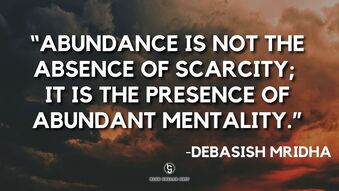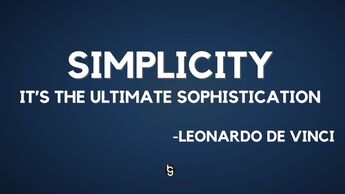Abundance Over ScarcityOne of the many challenges in any team endeavor is convincing your group there is enough to go around - enough time, enough important roles, enough recognition. From the outside, it appears there is a limited supply; and in some situations, on some teams, there certainly is.
“I'm going to get mine” is a phrase so common in the coaching world that it prompts a conversation in virtually every locker room in the country, for every sport in the country, at every age group in the country. It doesn’t always take the shape of that exact sentence, but the message shared by the team member is very clear: There’s not enough to go around so I need to get mine before you get yours. Of course, this mindset is only perpetuated by parents and adults involved in youth sports. If you want to get on the top team you need to score more goals, have more hits, or average more points. Only one person on the team can be the leading scorer. If you want to play at the top colleges you have to be a five star recruit. Only a certain number of players are five stars. This mindset goes far beyond sports. We have the same thing within the majority of businesses throughout the country as well. There is usually only a single CEO, COO, or president. If you want to move up the ladder, you had better increase your sales, sign the next big client, or create a revolutionary product. The mindset of scarcity is alive, and well, in all walks of society. It’s a way, but it certainly doesn’t have to be THE way. Why Should We Care? Scarcity says you’ve got to get yours and there isn’t enough to go around. Scarcity says it’s either you or me and either I win or you win, but we never both win. Scarcity says your salary shines a light on your value and your title shows the world your worth. On the best teams, this simply isn’t true. As a matter of fact, the scarcity mindset is forced to yield to the overflow of the abundant mindset. Abundance says we can all get ours and there is more than enough to go around. Abundance says it’s me and you and we both can win the same race. Abundance says your salary is just your salary and your title is little more than the name of a position. On teams operating out of an abundant mindset, success is defined differently, yet high achievement is the norm. Honoring the process is the mission, however. It’s the relentless pursuit of a full contribution to the process that provides the value to each team member. Success is available to all. All teams claim to value the roles of all team members but the truth can be found in whether they operate from a culture of scarcity or abundance. Cultures of scarcity highlight the top performers, or better said, the most publicly recognized performers. Cultures of abundance recognize that every single team member is equally responsible for and success the team experiences. REAL TALK - Action Steps While we are conditioned to think from a place of scarcity, there are plenty of examples around us in which a mindset of abundance is thriving. Teams with this abundance mindset thrive because we all want to be valued and feel like we are vital contributors to the team. Here are a few ideas on leaning into and growing the abundant mindset on your team.
Being a role player on a team has gotten such a bad wrap over the years. It’s a clear indication that the scarcity mindset is alive and well. However, we are all role players - even the superstars. Our roles are what allow us to contribute the most significantly and effectively to the team. As we clarify, support, and recognize these roles we begin to slowly move from scarcity to abundance. For more information on building excellence in your teams, visit us at www.bluecollargrit.com. We would love to know how we could help!
1 Comment
RePost: Giving ThanksThanksgiving is my favorite holiday.
Yes, it’s basketball season, but that’s not the only reason. Thanksgiving is pure, at least in its celebration. Primarily because it isn’t diluted with the expectations of buying, or receiving, gifts. It’s simply a time to share gratitude and appreciation for each other. It seems to me that we need to practice thanksgiving more regularly than once a year. Why Should We Care? As a leader, I think it’s critical to have systems in place that allow team members to openly share their appreciation for each other. If it’s left to chance, expressing gratitude seems to fall victim to ‘I didn’t have time’ quite often. I’m a big advocate for gratitude journals and writing down three things you are thankful for each day. It’s one of my daily routines. I love Thankful Thursdays when our team sends a text of gratitude to three people they are thankful for, reminding them why they are grateful for them. Better than a text is a handwritten letter, of course. However, nothing beats a face-to-face thank you. It’s awkward and awesome at the same time. Saying “Thank You” or sharing gratitude is one of the habits Daniel Coyle identified as consistently appearing in the interactions of elite teams. I believe the reasons for this are numerous, but here are a few that standout on the teams I’ve worked with.
REAL TALK - Action Steps Here are a few systems we have in place to say “Thank You”.
Saying ‘Thank you’ is one of those Slight Edge habits that Jeff Olson writes about in his book. They’re easy to do and easy not to do. Choosing to do it can change your team. For more information on building excellence in your teams, visit us at www.bluecollargrit.com. We would love to know how we could help! ClimbersMost will only have a few and some will only have one.
The number isn’t as important as the awareness of their presence and impact in your life. When most hear the term ‘climber’ they think of thrill seekers traversing the face of El Capitan or shrewd business moguls navigating the corporate ladder. I have a different image of a ‘Climber’. For me, Climber is a moniker reserved only for the most elite members of my foxhole. All Climbers are in my foxhole but not all in my foxhole are Climbers. Climbers need a special designation. I often describe my foxhole as that small group of family and friends that would drive two hours at three o’clock in the morning to pick you up if your car broke down. They’re critical to your safety, growth, and happiness. Your Climbers, however, wouldn’t require a phone call - they would be with you. When you throw out an idea like driving three hours through a level three snow emergency to scout an upcoming opponent, Climbers just ask what time we’re leaving. When you work and work and work and finally achieve something you never thought was possible Climbers celebrate … and cry, more than you do. When you act out of line with who you want to be, Climbers tell you in a way that is impossible to misunderstand. Bystanders would confuse it with judgment or hatred, but you accept it as the love it is intended for. When your kids are pursuing their dreams, the same Climbers that refused to compliment anything they did growing up become their biggest fans. They brag about them and tell more stories than you do - their pride rivals your own. Climbers make life awesome. Why Should We Care? Society calls us to pursue things - job titles, salaries, and recognition. We bite on this just to sprint to the end of a life that we don’t remember living. Only we don’t usually realize it until it’s too late. Climbers push pursuit too. But things literally mean nothing to them. What you wear, what kind of car you drive, how much money you make, how big of a house you come home to is one hundred percent irrelevant to a Climber. As a matter of fact, making too much effort in any of those directions raises a Climber’s antenna and will provoke a question, or jab, just to make sure you aren’t straying from what’s really important. A Climber’s pursuit is pure, much like that of the lone alpinist on El Capitan. There is no comparison, no judgment. There is only challenge and struggle followed by inevitable growth. Adversity is paramount to a Climber. It provides the footholes for the growth they desperately strive for. The struggle is foundational to their happiness. It’s not a normal relationship. Your acquaintances talk to you when you see them. Your friends love and support you no matter what. Your foxhole will tell you the truth and always go out of their way to help you. Climbers elevate you as a human. Sometimes through ridicule and conjoling, and sometimes through tears and heartfelt sentiments. But, always through truth and love. REAL TALK - Action Steps So, do you have any Climbers? If so, who are they? If not, how do you find them? I’m guessing you have one or two in your life - just make sure they know it too. Here are a few ideas for helping you in that quest.
I’m lucky enough to have a few Climbers in my life. I do my best to repay them by being Climbers for them. Appreciate and enjoy them regardless of other people’s opinions of them - most won’t understand and that’s ok - they’re in your foxhole, not theirs. FATH. For more information on building excellence in your teams, visit us at www.bluecollargrit.com. We would love to know how we could help! The ConnectorsMalcolm Gladwell’s 2002 book, The Tipping Point, shares why certain products, behaviors, and ideas spread like epidemics. The focus of the book is not about the brilliance of any specific product, behavior, or idea; but rather about how we can intentionally initiate and tap into the epidemic itself.
Of the many powerful ideas Gladwell shares, one of them has shown itself consistently in my leadership journey and the journey of those I’ve been able to observe. In The Tipping Point, Gladwell describes the three types of people that foster change: mavens, salespeople, and connectors. Mavens know what’s going on, but a lot of people are knowledgeable. The thing that separates a maven is their willingness to share their knowledge. Unfortunately, the willingness to share is not a given. Especially for someone possessing a unique product, coveted behavior, or revolutionary idea. Mavens, however, give openly and they do so with clarity. Salespeople sell. They convince others that what is being sold is not only desired, but needed. Salespeople communicate clearly and have the emotional intelligence to know when and how to best position the message or product being sold. They genuinely believe in what they are selling and are passionate about helping others by including them in the benefits. Connectors distribute and collect information, but more importantly they link one person to another. Connectors know who knows what, where to send others with questions, and how to get the information needed to move forward. They are critical to the spreading of an epidemic because they are the ones that share it with others. Turning our focus to leadership, the importance of mavens, salespeople, and connectors differs slightly from Gladwell’s epidemic application but it applies equally as well to teams. Why Should We Care? Teams are always a dynamic collection of individuals. None are the same and none are simple. The diversity of a team is its greatest strength. That is, when we recognize and support those differences. Mavens, salespeople, and connectors certainly provide a vast array of differences. Most leaders openly recognize the contributions of the mavens. Their wisdom and brilliance is typically viewed as the foundation of the team. In sports, this is often simply thought of as talent. There is no shortage of value placed on talent. The same can be said for most businesses as they are also on a constant hunt for the next superstar. Salespeople are also clearly valued in the team setting. Virtually every business has an entire division designated specifically for sales. As the leader of a team, it’s important to understand that your salespeople are not only those working in that division, they’re also your fans - the people that believe in, follow, and support your team. The connectors are the most undervalued team members because their contribution to the group is not easily measured. It doesn’t show up in new products or clients, like mavens and salespeople. And, in sports, it typically doesn’t show up on a stat sheet. But, it’s connectors that ultimately make a team, a team. Without connectors the group remains a collection of individuals. The connectors are the ones that help everyone appreciate the roles of each individual, celebrate each other’s contribution, and push the prioritization of the team over the individual. REAL TALK - Action Steps The talent, confidence, and unselfishness of a maven fits perfectly with the passion and brashness of salespeople on a team. The connector’s value of the team over all else melds the whole thing together. Teammates with characteristics of all three are what make a team special. Here are a few ideas on how to grow or foster each aspect of those great teammates.
Everyone on our team brings something to the table. Ideally, all possess a portion of the maven, salesperson, and connector Gladwell described. Pay special attention to the connectors. When teams are performing beyond their talent or skill level, it’s almost always a result of exceptional connectors at work. For more information on building excellence in your teams, visit us at www.bluecollargrit.com. We would love to know how we could help! Addition By SubtractionAs a young coach, I always thought the answer was in more - more offensive sets to run, more defensive systems to play, more baseline out of bounds options to call. The sporadic jolts of success were enough to fool me into believing more was the way.
I would attend clinics or conferences, amazed by the success others were experiencing by doing all the things I wasn’t doing. I scribbled down notes, vowing to be better by committing to these new found secrets. Each session led to additions to my approach, and to our program. We read to expand our knowledge. We network to grow our contacts. Progress by expansion is the model we’ve come to accept. The more things we know, the better. The more people that know us, the better. Clearly more is better, right? Society loves to shove it in our faces - more money, more cars, more rooms, more things is how we express our success. It would be hard to argue if it weren’t so wrong. Why Should We Care? If we’re astute, as we travel down this path of more we will notice something that clearly separates the average from the excellent. We have to look below the surface, and know what to look for, but it’s always there. The problem is, we always look at the margin instead of the core. See, the difference isn’t in an offensive set or a baseline out of bounds play. It’s not in a great client or better pension plan. The difference isn’t in what anyone does, it’s in how they do it. Unfortunately, we don’t want to believe the simplicity of how the best do what they do. We want it to be about more, not less. Listen to an interview with someone that has sustained excellence in any field. The best leaders will always talk about the same things: building relationships, serving others, working hard, and being exceptional at the ‘fundamentals’ of their specific trade. Sure, some will say it in their own way with their own clever vernacular, but they all say the same things. You know what we do when we hear this though, right? Sure. We dismiss the reference to the basics as being obvious and cling to any marginal information or examples that provide us with the more we were craving. Everyone does it, everyone except the excellent. For some reason, they hear it a little differently. They see the drastic commitment to the few as the driving force it is. They quickly disregard the margins, realizing that’s a personal choice that can, and should, change from leader to leader. Those on the path to excellence are in tune with the foundation of the process, not the details based on personal preference. They’re examining the core, not the margins. REAL TALK - Action Steps The appeal to make additions to our system is not only significant, but necessary in order to progress and improve. However, we must be careful to avoid addition as our only means for growth. In fact, the opposite, subtraction, is a quicker path to excellence. Here are a few ideas on how to get, or stay, focused on the core rather than the margins.
Don’t be fooled by the simplicity of excellence. Adding seems like the answer, oddly enough, it hardly ever is. By thinking about removing the trivial we free ourselves to commit the necessary time to the critical. For more information on building excellence in your teams, visit us at www.bluecollargrit.com. We would love to know how we could help! |
About bcI'm a teacher, coach, and parent seeking excellence while defining success on my own terms. Archives
July 2024
Categories |






 RSS Feed
RSS Feed